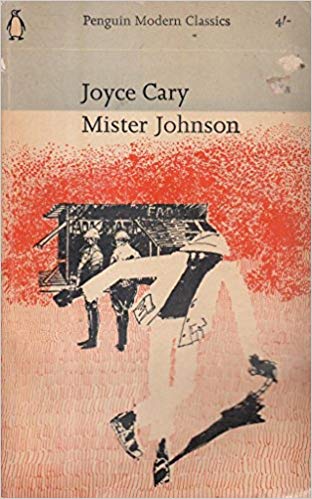Mister Johnson by Joyce Carry (Book Review)

One problem with rating things on a scale from one to five or from one to ten is that an average score tends to be become associated with around a C+ or a B-. For example the subjective beauty scale usually reserves 7/10 for an average human and literary rankings grant 4/5 for a decent book. A consequence of this is that ratings scored around this inflated mean can actually have a quite diverse range of quality. Luckily for a book like Mister Johnson, this issue does not present itself. Such poor writing, blatant (even for its time) racism, and wholly unrealistic and unsympathetic characters means that this book is indubitably a 1/10, 1/5, 1/1000, 1/1+e30, …, etc, and without reservation the worst book I have read in recent memory.
Having read books about Africa or by African novelists this year (Disgrace by J.M. Coetzee, Africa and the Victorians by Ronald Robinson, The In-Between World of Vikram Lall by M.G. Vassanji, The Politics of Bones by Timothy Hunt, and Things Fall Apart by Chinua Achebe) I was looking forward to reading Joyce Cary’s Mister Johnson as is it often found on lists of important novels about Africa. Published in 1939, it was one of the first novels to feature an African as a protagonist. Cary had served as a British Colonial Officer in Nigeria in the 1910s and 1920s and I had imagined his experiences would produce a story with a similar level of insight and humanity found in Orwell’s Burmese Days. We follow the rise and fall of the eponymous Johnson who is a clerk at the British district office in Fada, Nigeria. The novel is likely set in the 1930s as references are made to lorries which would have unlikely to have been in rural Nigeria before then.
While we are unsure of where Johnson comes from, he speaks English decently and considers the local tribesmen to be savages. A thorough Anglophile (like Dr. Veraswami), Johnson goes to great lengths to ensure his Nigerian brethren understand he is a cut above them by wearing white cotton suits, leather shoes, and carrying a tightly wrapped umbrella (for the sun or the rain? we are not sure). While endlessly ingratiating to his superiors, Johnson seems able to only grasp certain aspects Englishness and Western behavior. After successfully courting the local beauty Bamu he demands she play the role of a proper Christian housewife and refuses to consider a polygamous family arrangement (common for successful men in Nigeria at the time). Bamu’s family are bemused by Johnson’s courtship rituals and seek the extract the maximal amount of financial resources in a reverse-dowry. On multiple occasions she is hauled back to her native village as an exasperated Johnson curses the natives for their ignorance about holy matrimony.
Rudbeck, the district officer of Fada, is also exasperated by Johnson’s inability to carry out simple tasks such as sorting mail or showing up to work on time. Johnson is portrayed as not just a bumbling incompetent but also a total imbecile. His thought patterns and time-horizons seem to be that of a child. This portrayal of intellectual diminution is extremely troubling given the long history of European racism being bound up with descriptions of natives as children and mentally incapable. Did Cary actually meet a native clerk in Nigeria that had Johnson’s constellation of feeble-minded traits? It seems highly unlikely. Any Nigerian who could speak English and work for the British authorities in the 1930s would surely have to have been fairly sharp. Whereas a modern audience may be troubled by a character like Shylock, he is at least given many human dimensions and shown to have interests and an intellectual capacity to try to obtain them. Johnson’s interests do not seem to extent beyond sycophancy and midnight revelries with purloined alcohol.
Johnson’s increasing kleptomania ultimately lead him to being caught by a local store owner Gollup, who Johnson in turn kills after being caught red-handed (in self defense?). In many scenes Gollup, who is not an considered an English gentleman by the locals, is cruelly beating his Nigerian wife. These scenes almost make reading the book unreadable not because the assaults are too brutal to read through but rather because of the seeming trivial or comic nature by which Cary writes about them. It feels as though the human being that Gollup is viciously assaulting is a comic book character with the words Pow! or Zonk! floating above them. A similar feeling happens when watching a Tarantino film like Django Unchained which has scenes of brutal violence tinged with a comic element. At least these scenes are self-aware.
In the same way that the death and starvation of more than half a million Russians in Leningrad can be credited for the artistic impetus of Shostakovitch’s famous 7th Symphony, Cary can at least be acknowledged with providing the literary impetus for Chinua Achebe to develop an organic and authentic Nigerian literature which would ultimately lead to his masterful African Trilogy series. According to Achebe:
I know around ‘51, ‘52, I was quite certain that I was going to try my hand at writing, and one of the things that set me thinking was Joyce Cary’s novel, set in Nigeria, Mister Johnson, which was praised so much, and it was clear to me that it was a most superficial picture of–not only of the country–but even of the Nigerian character, and so I thought if this was famous, then perhaps someone ought to look at this from the inside
And:
[I]t becomes doubly offensive when such a work is arrogantly proffered to you as your story. Some people may wonder if, perhaps, we were not too touchy, if we were not oversensitive. We really were not.
As Johnson awaits his execution as punishment for his murder, he apologizes to Rudbeck for causing him so much trouble and asks that he be personally executed as a farewell gift. A wholly implausible state of mind. After carrying out the execution in a manner we would expect from Lawrence of Arabia, the novel is gratefully concluded. While being a short book, Mister Johnson remains a waste of time for anyone who expects to have a finite lifespan. Except for scholars interested in say understanding European perceptions of colonial subjects or individuals who enjoy hate-reading this book should be avoided.
